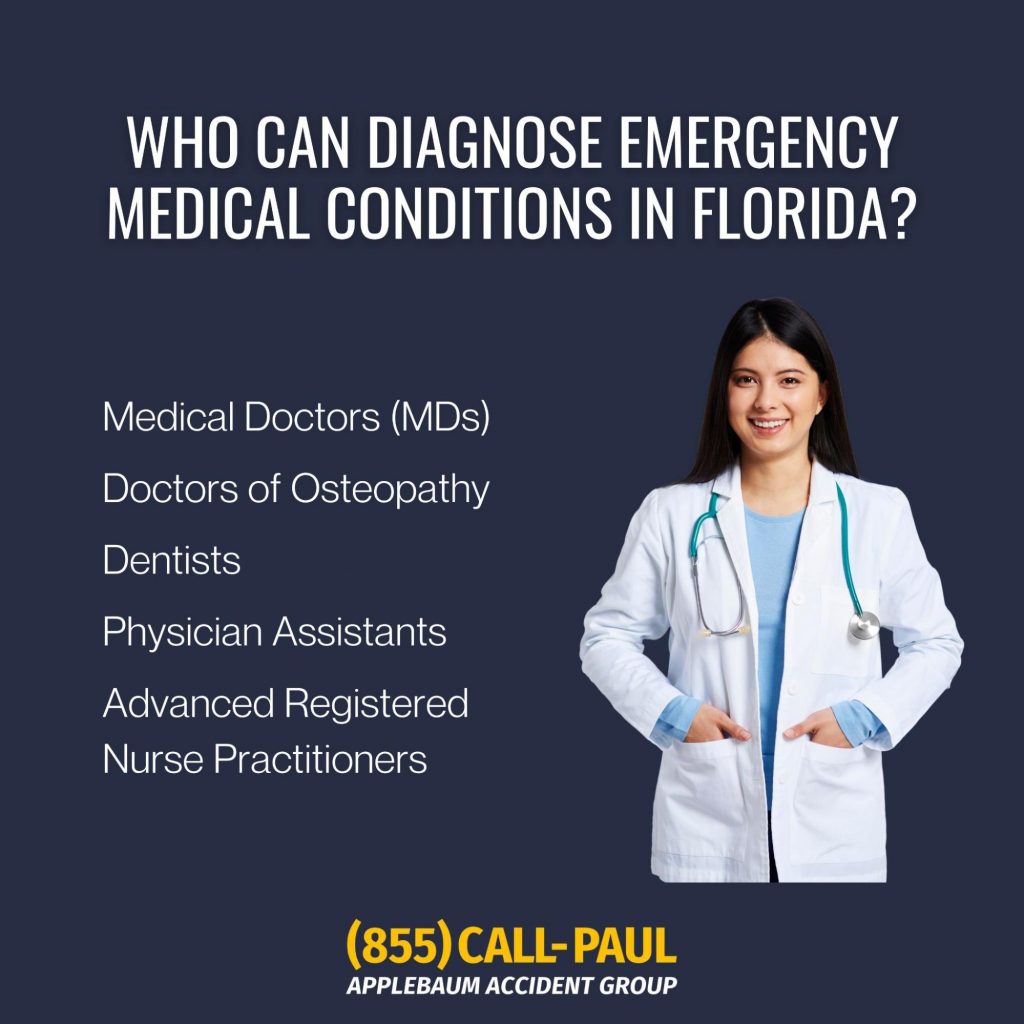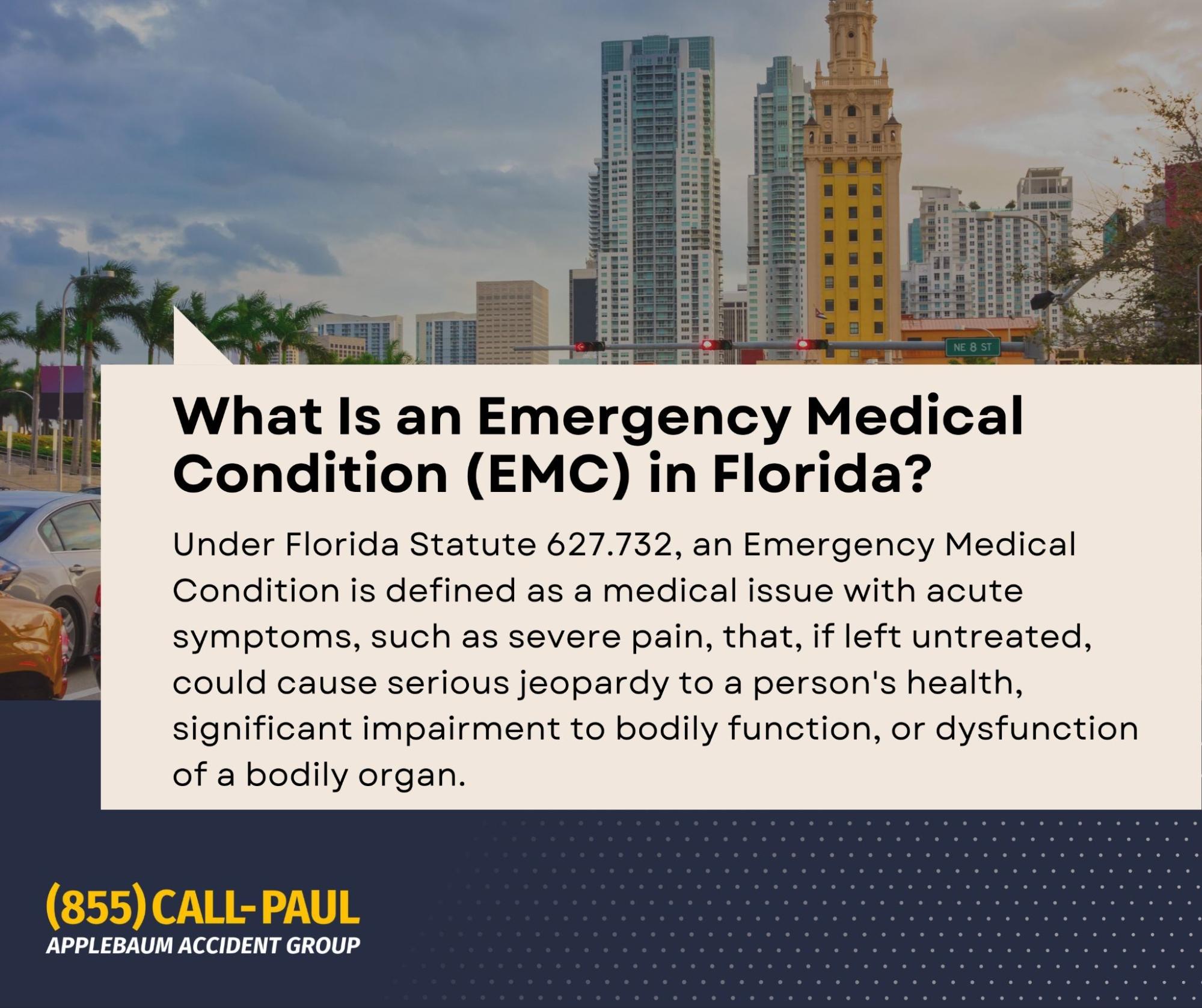If you’ve been injured in a car accident in Florida, understanding what qualifies as an Emergency Medical Condition (EMC) could mean the difference between receiving $2,500 or up to $10,000 in Personal Injury Protection (PIP) benefits.
An EMC is defined by law as a medical condition with acute symptoms, such as severe pain, that, if left untreated, could result in serious health risks.
In this article, you’ll learn exactly:
- What qualifies as an emergency medical condition in Florida,
- How EMC status impacts your insurance benefits,
- How to avoid pitfalls that could jeopardize your recovery.
- What counts as emergency treatment
Let’s dive in.
What Is an Emergency Medical Condition (EMC) in Florida?
Under Florida Statute 627.732, an Emergency Medical Condition is defined as a medical issue with acute symptoms, such as severe pain, that, if left untreated, could cause serious jeopardy to a person’s health, significant impairment to bodily function, or dysfunction of a bodily organ.
Why does this matter?
Because your eligibility for full Personal Injury Protection (PIP) benefits hinges on this classification, without an EMC, PIP insurance in Florida caps at $2,500. With a confirmed EMC diagnosis, you could access up to $10,000 for your medical care.
A frequent question we encounter is: “Do I need to fill out a special form for EMC?” The answer is no.
There is no standardized form required, but what’s essential is that a qualified medical professional documents the EMC in your medical records. Without this, insurers may limit your PIP benefits or deny your claim entirely.
Who Can Diagnose an EMC?

Florida law specifies that only certain licensed medical professionals can diagnose an Emergency Medical Condition. This group includes Medical Doctors (MDs), Doctors of Osteopathy (DOs), Dentists, Physician Assistants (PAs), and Advanced Registered Nurse Practitioners (ARNPs).
One advancement making life easier for accident victims today is the recognition of telemedicine EMC assessments. With this option, you can be evaluated remotely, often from the comfort of your home, saving time and avoiding the stress of in-person appointments.
Our advice? Always obtain written confirmation of your EMC diagnosis. This ensures clear, documented proof for your insurance provider and legal representation.
What Qualifies as an Emergency Medical Condition?
Common Injuries That Meet EMC Criteria
Certain types of injuries are commonly classified as EMCs in Florida. These include:
- Traumatic brain injuries
- Spinal cord damage
- Complex or multiple fractures
- Internal bleeding.
However, it’s not just life-threatening injuries that qualify.
Moderate injuries that worsen over time or have the potential to impair bodily functions also meet the criteria.
For example, a seemingly minor back injury could escalate into a serious impairment without prompt medical intervention. That’s why it’s critical to seek a professional evaluation after any accident, even if your symptoms appear mild at first.
Debunking a Myth: “Only ER Visits Count”
One of the most persistent myths we encounter is the belief that only emergency room visits result in valid EMC evaluations.
This is not true.
EMC assessments can be performed at various locations, clinics, primary care offices, and through telemedicine services like TeleEMC.
However, it’s worth noting that not all urgent care centers provide EMC evaluations. Some may refuse based on internal policies or lack of specific medical expertise. Knowing where to go is critical. If you’re unsure, Applebaum Accident Group can help direct you to qualified providers who can ensure your EMC is properly evaluated and documented.
The Sudden Medical Emergency Doctrine in Florida
The sudden medical emergency doctrine is a legal defense in Florida that can relieve a driver from liability for an accident caused by an unforeseen medical event. For instance, if someone experiences a heart attack or seizure while driving, they may invoke this doctrine to argue they weren’t negligent.
However, it’s essential to understand that this doctrine is entirely separate from EMC determinations. The sudden medical emergency doctrine pertains to legal liability in court, whereas EMC status influences your access to insurance benefits under Florida PIP laws.
To better understand the relationship between PIP and other required coverages, read: What Is PIP And PDL Insurance in Florida?
What Is Considered an Emergency Condition in Florida?
Beyond Car Accidents: Broad Applications
While much of the conversation around Emergency Medical Conditions (EMCs) in Florida focuses on car accidents, you need to know that EMC applies to a range of acute medical situations.
This can include heart attacks, strokes, or severe allergic reactions, any condition that requires immediate medical attention to prevent serious health risks.
However, in the specific context of auto accidents, EMC takes on a vital role by determining access to expanded PIP (Personal Injury Protection) benefits. Without an EMC, your medical coverage is limited, potentially leaving you with significant out-of-pocket costs.
This is where our team at Applebaum Accident Group helps bridge the gap, ensuring that your EMC is properly evaluated and that you gain access to the full benefits you’re entitled to.
The Importance of Timely Care
Florida’s PIP statute imposes a strict timeline: you must see a medical provider within 14 days of your accident to preserve eligibility for any PIP benefits, regardless of whether your injury is later classified as an EMC.
A question we often hear: “What if I feel fine at first?” This is one of the biggest pitfalls accident victims face. Symptoms like stiffness, headaches, or minor pain can evolve into serious medical conditions days or even weeks later. Without that initial medical documentation within the 14-day window, you risk losing access to your PIP coverage altogether.
For a deeper look at how the 14-day rule affects your ability to claim PIP benefits, check out our article: Florida 14-day accident law.
This is why we strongly encourage anyone involved in an accident to seek immediate medical evaluation, even if injuries seem minor. Early care can protect both your health and your financial security.
What Is an Emergency Treatment Order in Florida?
An emergency treatment order is distinct from an Emergency Medical Condition. While EMC is a legal classification tied to insurance coverage, an emergency treatment order refers to specific medical directives in critical care scenarios. These are decisions made by patients or their legal representatives and documented by healthcare providers.
Examples of emergency treatment orders include Do Not Resuscitate (DNR) orders or authorizations for emergency surgery. These are intended to guide medical interventions in life-threatening situations, ensuring that care aligns with the patient’s wishes or clinical necessity.
Why This Confuses Patients
Many accident victims mistakenly believe that a formal order is required to access PIP benefits in Florida. This misunderstanding can lead to delayed care or incomplete documentation.
In reality, there is no required “order” for an EMC. What matters is that a qualified healthcare provider evaluates your condition and documents whether it meets the legal criteria for an Emergency Medical Condition. This evaluation forms the foundation of your insurance claim.
At Applebaum Accident Group, we help clients navigate this process, ensuring that their medical records clearly establish EMC status, thereby maximizing their access to PIP benefits.
How Does EMC Status Impact Your PIP Insurance Claim?
The presence or absence of an EMC diagnosis is pivotal to your PIP insurance claim. If your condition does not qualify as an EMC, your insurance benefits for medical treatment will be capped at $2,500. If your condition is diagnosed as an EMC, your benefits can extend up to $10,000.
One misconception we frequently encounter is the belief that an EMC automatically guarantees a larger legal settlement. This is not the case. While an EMC can significantly expand your available medical coverage, it does not directly influence the amount of compensation you might recover through a personal injury lawsuit. Instead, it provides the financial means to obtain necessary medical treatment in the immediate aftermath of an accident.
Can Insurance Deny an EMC Determination?
Yes, insurance companies can and do dispute EMC determinations. They may argue that the diagnosis was not properly documented or that the condition does not meet the statutory threshold.
Our advice is straightforward: work with medical providers experienced in PIP documentation who understand how to correctly assess and record an EMC.
A common concern we hear is, “What if my EMC is denied?” If your insurer disputes or denies your EMC-based claim, you have the right to appeal the decision or seek legal counsel to protect your benefits. At Applebaum Accident Group, we specialize in connecting accident victims with the right professionals to ensure their rights and benefits are upheld at every step.
Real Concerns People Have About EMCs in Florida
Worry #1: “Will I lose PIP benefits without an EMC?”
Yes. Without an EMC diagnosis, your PIP coverage is capped at $2,500. To access the full $10,000 available, an EMC diagnosis must be properly documented. That’s why it’s imperative to seek medical attention immediately after an accident, delays can jeopardize both your health and financial support.
Worry #2: “Can my insurance deny my EMC diagnosis?”
Absolutely. Insurers may contest the validity of EMC assessments, particularly if documentation is incomplete or the evaluation is performed by a provider unfamiliar with Florida’s PIP requirements. However, you always have the right to challenge such denials. Applebaum Accident Group works closely with experienced professionals to minimize the risk of disputes and guide clients through appeals when necessary.
Worry #3: “What about out-of-pocket costs?”
Typically, PIP insurance covers the cost of EMC evaluations, but policies vary. Always confirm your provider’s billing practices beforehand to avoid unexpected expenses. We advise clients to be proactive, ask about costs and coverage early to avoid unpleasant surprises.
Pro Tips for Navigating EMC Evaluations and Claims
- Ask providers directly if they perform EMC evaluations, don’t assume all do.
- Ensure your medical documentation clearly includes language indicating an EMC determination; vague notes can lead to insurance denials.
- Use Florida’s Health Finder tools to locate healthcare providers with experience in EMC evaluations and compliant with state regulations.
- Consider telemedicine for convenience, especially if you live in a rural area or face challenges accessing in-person care.
If you’re ready to initiate your claim after receiving an EMC diagnosis, follow our detailed guide: Step-by-Step: How to File a PIP Claim After a Florida Car Accident.
EMCs Protect Your Health and Rights
An Emergency Medical Condition classification has a significant influence on both your medical care and your financial protection through PIP insurance in Florida. Acting quickly to secure an evaluation can ensure that you receive the care and compensation you deserve.
If you’ve been in an accident, don’t hesitate, seek medical care, ask about EMC evaluations, and ensure your rights are fully protected.
Take Control of Your EMC Diagnosis and PIP Benefits with Applebaum Accident Group
If you’ve just realized how pivotal an Emergency Medical Condition (EMC) diagnosis is for protecting your health and securing up to $10,000 in PIP benefits, you might be wondering: “Where do I go from here?” Navigating Florida’s complex EMC rules alone can lead to missed benefits, denied claims, or even legal missteps. That’s exactly where Applebaum Accident Group steps in.
Here’s How We Can Help You:
- We connect you to qualified EMC providers, whether in-person or through telemedicine, who understand exactly how to document your condition for maximum PIP benefits.
- We match you with attorneys who take your case seriously and know how to fight insurance denials effectively.
- We offer guidance every step of the way, ensuring your EMC evaluation, medical documentation, and legal representation are coordinated for the strongest possible outcome.
What Life Looks Like After You Work With Us
With Applebaum Accident Group on your side, you’ll stop second-guessing your next steps. Instead, you’ll have access to medical providers who prioritize your care, legal professionals who understand the intricacies of EMC law, and a dedicated team that ensures you don’t leave money, or recovery, on the table.
📞 855-225-5728 | Request An Appointment





